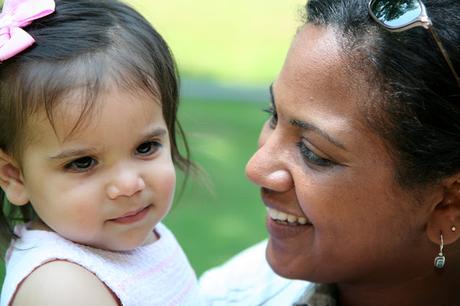
If there's one thing I've always been conscious of when raising my children, it's the fact that they are growing up in a part of the country where they are not exposed to a great deal of diversity on a regular basis.
There are so many different cultures and kinds of families living in the UK today, Whether it's same sex families, adoptive families, families from other countries or cultures, families who co-parent - our country is a melting pot of so many different family units, and I feel that it's incredibly important to ensure that we are raising children who are inclusive and accepting of everybody.
We live in a small seaside town and the vast majority of people that they see every day and interact with at school are people who look and live a lot like them - and so I want to find ways to make them aware and accepting of the many other cultures, races and family make-ups that there are, even if they don't come across them every single day. I want them to be aware of the fact that not every body looks or lives the same way as we do, not every celebrates the same holidays, not everybody has 1 mommy and 1 daddy at home...because I personally feel that the sooner they understand this, the more likely they are to be accepting of other people.
But it can be difficult to know how to find ways to educate young children about these things without being too forceful.
However, I don't want my child to be the one in the playground who is shocked when he hears that little Tommy has two mummies or makes a cruel comment about it or anything else along those lines. I want them to know from the very beginning that not everybody in this world is the same, but that everybody deserves our respect and our kindness. That is honestly the most important thing to me.
So here are some of the ways we try to ensure that we are raising accepting and inclusive children from a young age.
1) Talk Inclusively & Answer Questions Honestly
As my first born has got older, he's naturally started to ask some questions about other people. For example, our next door neighbours are a Sikh family and one day he asked why they didn't have a Christmas tree up - this gave me the perfect opportunity to talk to him about different cultures, explain that not everybody celebrates the same holidays as we do and then discuss with him some alternative celebrations such as Diwali, Eid, etc and the cultures that celebrate them.
I also try to make sure that I use inclusive language around the children - I'm always cautious never to refer to their school friends "mummy & daddy" but rather their family as this doesn't make assumptions about who makes up each child's family. If I don't automatically assume that a child has a mother and a father at home with them, then hopefully my children will pick up on this and will also learn not to assume.
2) Use Diverse Reading Material
I noticed that a huge percentage of my childrens story books seemed to contain characters who were white and who came from families with a mother and a father...so I made a conscious effort to diversify their reading materials and it's surprisingly easy to do as there are lots of great books out there to help.
Some of our favourites are: Who's In My Family? , The Great Big Book Of Families & The White Swan Express
3) Provide An Open And Accepting Environment
This probably goes without saying, but one of the most important aspects of raising inclusive children for me has been ensuring that my children are raised in a home that allows them to express their individuality without any assumptions and demonstrate good non-biased role model behavior for them.
We try to expose them to a range of music and foods from all over the world, and ensure that their toys are diverse and are not chosen based on gender stereotypes. For example in my house of 3 boys, we have as many dolls, pushchairs and play kitchens as we do cars, dinosaurs and superheroes - this allows them to make their own decisions on what they like to play with rather than having to make a choice from a selection of gendered toys which limits their interests.
When opportunities arise to discuss biases that the children observe, we try to make sure that we address the issue and talk about ways that things could be more inclusive. For example, a while ago my eldest son pointed out that a TV advert for a toy showed only little girls playing with it...he stated that this meant the toy was only for girls. We then used this as an opportunity to discuss why all toys are suitable for any child who likes them, and how the toy company could have done a better job of making all children feel included.
These are just a few of the ways we try to ensure that we're raising inclusive children, I'd love to hear any of your own suggestions in the comments below.
If you enjoy my blog, please consider following me on Bloglovin'
